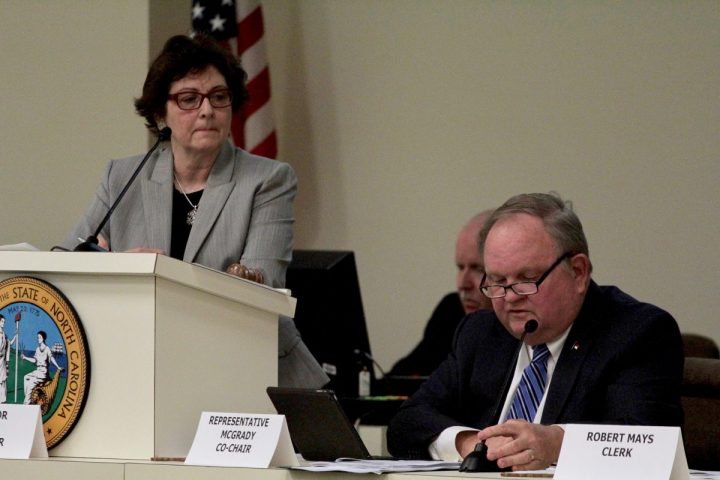
RALEIGH – Each session of the North Carolina General Assembly generates dozens of changes and additions to state environmental policy, but increasingly the debate on high-impact and controversial issues is taking place outside the committees assigned to handle them and outside the public’s view.
Conversations inside the caucuses of both parties in both chambers on renewable energy, waste management, stormwater runoff regulations and other environmental subjects have been described as contentious, but those talks are closed off, taking place in rooms with drawn curtains.
Supporter Spotlight
What survives the caucus process is drawn up into legislation through one of several interlocking conference committees, which also hold closed-door meetings. The bills that have emerged tend to be lengthy, with multiple provisions. Unlike most other bills, conference reports cannot be amended, requiring only an up or down vote.
Although it’s a common practice, some of those involved in the process say they’re worried that it has become the main way of doing the people’s business and not the exception.
“I’m not happy with the process, not just with the environmental bills, but particularly with the environmental bills,” Rep. Chuck McGrady, R-Henderson, a chief House negotiator, said in a recent interview.
McGrady said that in the past year most of the interim committees that work out differences between the House and Senate bills have not met, leading to a less orderly process.
“We just don’t do what we used to do in terms of using committees, doing things between sessions, doing a lot of the work on gleaning the facts,” he said, “It’s more about bullying your way through whatever the issue is.”
Supporter Spotlight
Without a more thorough process in place, McGrady said, it’s harder to do the proper vetting for policy proposals.
McGrady and others say one key to restoring a better vetting process for environmental policy would be to reinstate regular meetings of the legislature’s Environmental Review Commission, a 16-member standing committee that has served as the legislature’s main conduit for environmental policy for more than a decade.
Since 2005, the commission has met an average of four times a year, often when the legislature is not in session or during the early weeks of sessions, to review reports and hammer out ahead of time differences between the chambers.
The commission has recommended dozens of major policy changes through the years. In 2014, the commission was the main investigative committee studying the Dan River coal ash spill and began the development of coal ash legislation during the legislature’s 2014 session.
The commission has since met less regularly, but did get together four times in early 2016 ahead of the short session. Prior to convening its public hearing on GenX Aug. 23 in Wilmington, its last meeting was held April 13, 2016.
Grady McCallie, senior policy analyst for the North Carolina Conservation Network, said the legislature has not just changed state environmental policies, but also how new proposals become law.
“The legislature is operating differently,” McCallie said.
Environmental proposals are now more ad hoc, coming from a variety of sources, and don’t seem to have the same kind of review as other proposals. The result, he said, is that some of the more “offbeat” ideas go much farther in the process than they do in other issue areas.
“You don’t see that for education policy or health policy,” he said, where there is a deeper bench of policy expertise among legislators. “To me, that’s a reflection of the bigger failure of the deliberative process.”
McCallie pointed to measures that are introduced to benefit specific industries or even a specific inventor like this year’s measure requiring the Department of Environmental Quality to accept a proposed process of spraying landfill leachate into the air to reduce the tainted water’s toxicity.
“One of the advantages of having the ERC back on track is that, if it’s working properly, you filter out ideas like that,” McCallie said. “It’s in their interest to have the ERC process get back on track, because of the kinds of proposals we’ve seen make the leadership look bad.”
McGrady, one of the House co-chairs of the commission, said last year that he and other House members tried to convince their Senate counterparts to meet to discuss coal ash and other issues, but the Senate leadership declined.
In a press conference held after last month’s session, McGrady and House Speaker Tim Moore, R-Cleveland, both expressed their hope that the commission will resume meeting regularly.
“It takes two to tango,” McGrady said.
In an email response to Coastal Review, Sen. Trudy Wade, R-Guilford, the Senate’s commission chair, said the commission meets when it is necessary.
“Interim committees like the ERC meet on an as-needed basis, when there is a need for legislative oversight,” Wade said. “Certainly, the discovery of the GenX discharge into the Cape Fear River and the administration’s reluctance to answer serious questions about its handling of this issue necessitated legislative oversight.”
“Certainly, the discovery of the GenX discharge into the Cape Fear River and the administration’s reluctance to answer serious questions about its handling of this issue necessitated legislative oversight.”
Sen. Trudy Wade
Even without meetings, the committee continues to play a role in environmental policy. It is, by law, the repository for a series of regular reports from state agencies and regulatory bodies, including the Environmental Management Commission that adopts water and air quality rules.
The number of reports adds up. Since its April 2016 meeting, the commission has received 39 reports from the state DEQ alone.
Many of the reports are annual or quarterly updates, but several are policy related, involving initiatives in aquaculture, energy policy and nutrient strategies. Over the next few years, the commission is also scheduled to be the main recipient of reports and proposals from the North Carolina Policy Collaboratory, which includes a range of studies, including shellfish and mariculture development and water quality strategies.
When the commission will meet again is unclear for now.
Last month in Wilmington, Wade said the commission would meet again in September to discuss Gov. Roy Cooper’s proposal seeking $2.6 million in additional funding for GenX-related testing, monitoring and public outreach.
In her email Tuesday, Wade did not say when the next commission meeting would be held, but noted that the commission assisted in the development of the GenX provisions in House Bill 56, including $435,000 in funding for the Cape Fear Public Utility Authority, mainly for GenX filtration testing and the University of North Carolina Wilmington for research, but none of the governor’s requested funding for DEQ.
Wade also credits the measure with pushing DEQ to finally issue on Sept. 5 a notice of violation against GenX producer Chemours.
“Have you asked whether the governor plans to sign it into law?” Wade asked in her email response. “Many of my colleagues and I feel that is a critical first step toward addressing this problem.”
Cooper’s office was contacted regarding the governor’s intent but did not respond in time for this report. In August, Cooper released a statement on House Bill 56, saying that a “sprinkle of local funds hooked to bad environmental legislation doesn’t help.”
Although nothing has been scheduled, there are some indications that interim meetings of joint committees could be coming.
Both Moore and Senate leader Phil Berger, R-Rockingham, announced appointments in recent weeks, including finalization of new appointments to the ERC.
“These committees provide key oversight to help ensure state government is accountable, transparent, and operating as efficiently as possible. They also offer a forum for research and discussion that will help inform lawmakers for the upcoming session,” Berger said in a statement announcing the appointments.








